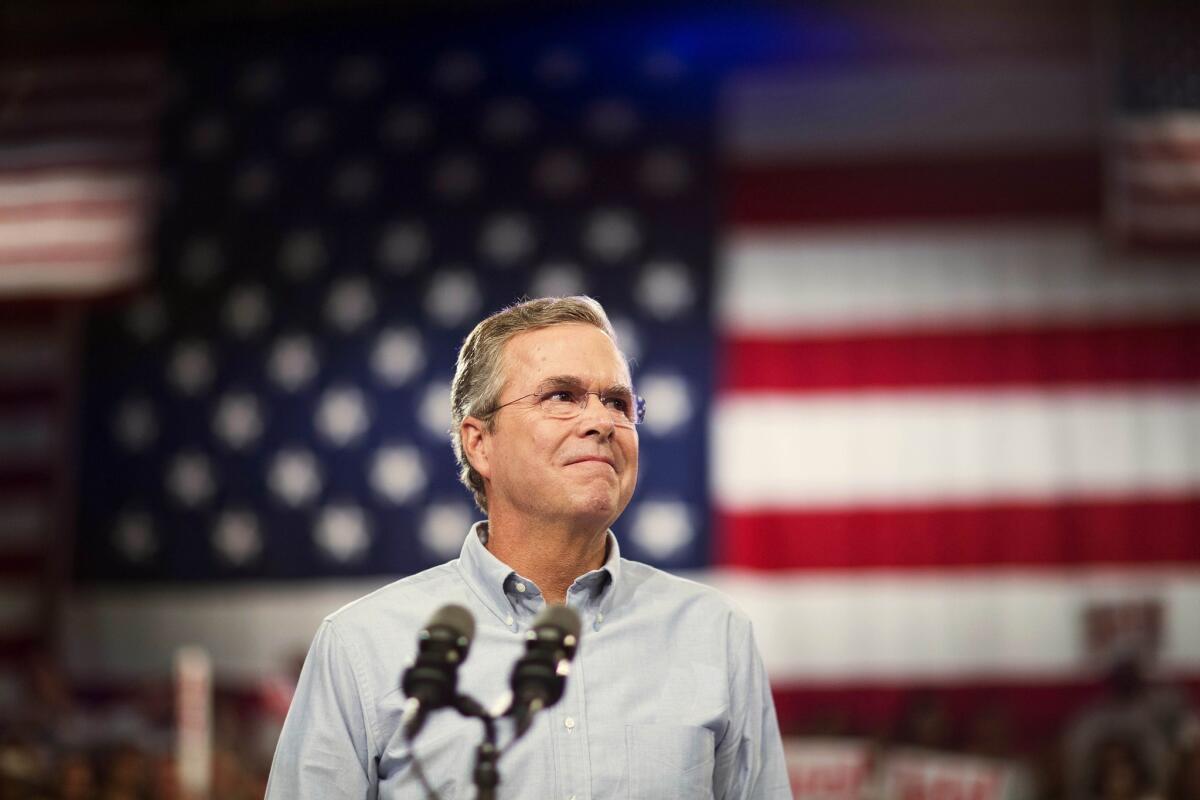Analysis: Will Jeb Bush form a new GOP, or will the old one torment him?

Former Florida Gov. Jeb Bush takes the stage as he formally joins the race for president with a speech at Miami Dade College on Monday.
- Share via
The presidential candidate who stepped onstage in Florida on Monday was everything, image-wise, that elements of the Republican Party have been saying they needed to have a fighting chance longterm in places like California, so much a bastion for Democrats that it hasn’t been seriously contested in five national elections.
Former Florida Gov. Jeb Bush spoke fluent Spanish and lauded his Mexico-born wife, Columba; he was preceded onstage by their son George P. Bush, who also addressed the audience in Spanish, and a musical combo of Latina sisters.
The Rev. R. B. Holmes Jr., an African American preacher, introduced Bush with a passion that outstripped even that of the candidate. And state Sen. Don Gaetz called the former governor “the new Florida.”
“He is the new America,” Gaetz said. “He is the new Republican Party.”
There’s no doubt that Bush, as part of a multiracial, bilingual family, comes closer to the new Florida and new America than many other presidential candidates, Democrats included. But even he didn’t seem all that confident about the rest.
Bush has been something of a quizzical presence in this race--a man knocked as a moderate by many in his party, despite the sharply conservative nature of his governorship. The fact that he outlined his Florida record so vigorously in his announcement suggested that if there is a new party, he doesn’t think it’s headed in his direction.
Bush’s announcement was gloriously staged; his remarks delivered with vigor; his crowd adoring. But his remarks could have been uttered by almost any of the dozen Republican candidates. What he left out, or intended to leave out, spoke loudly.
He insisted that he would campaign “everywhere, speaking to everyone, keeping my word, facing the issues without flinching, and staying true to what I believe.”
That seemed to be code for two issues that had flummoxed him--his support for the Common Core national school standards and for changes in the immigration system to protect those in the country illegally. Yet he punted a bit.
“Every school should have high standards, and the federal government should have nothing to do with setting them,” he said, not explaining that he still supports the federal standards.
His only reference to immigration came as an ad-lib after he was interrupted by protesters seeking citizenship rights for those here illegally.
“By the way, just so our friends know, the next president of the United States will pass meaningful immigration reform so that will be solved, not by executive order,” he said, dismissing President Obama’s protection of millions of immigrants while at the same time giving fodder to anti-protection Republicans.
The fix Bush finds himself in is this: So much power remains in the old Republican Party that he had to forcefully define himself as a conservative and skip over problematic issues. But that left little--other than the multicultural visuals--to attract people who might make up the new Republican Party.
That matters in states like California because, in modern politics at least, change comes from the top.
In recent elections, two women and one moderate of Indian heritage have been party nominees for either governor or U.S. senator. Even though they were not the traditional GOP candidates, they were tripped up by the R behind their names. Whatever their own candidacies’ weaknesses, they also paid for the image of their party.
In 2016, Bush and any other Republican seeking non-traditional voters will have an additional problem in California and elsewhere: the conflict between the old party’s antipathy toward Obama and his outsized popularity among their new targets.
Take healthcare, another subject not mentioned by Bush on Monday. In California, a March poll by the Public Policy Institute of California found that just over half of the state supported Obama’s healthcare reform. But among Latinos, support hit 61%. And among Asians, another ascending voter group coveted by Republicans, support was at 58%
So every Republican criticism of Obama’s healthcare plan, or immigration moves, or environmental actions--to cite another area of rapt interest among minority groups--energizes the old base and risks distancing the voters the party will need in the future.
In an address in Irvine on Friday night, Republican presidential candidate Rand Paul hit on the same notion of creating “the new GOP.” By his telling, it would be a party that defends the entirety of the Bill of Rights and not just the 2nd Amendment’s protection of guns.
His focus was on domestic spying as part of the war on terror. Like Bush would on Monday, he also left out plenty: mention of immigration, the environment, abortion or other topics that have formed a divide between the parties.
“The sky’s the limit! We can win elections in California,” Paul said. “But we have to have something to offer, and it can’t be the same old, same old.”
On Monday, the visuals of the Bush announcement were new; in its multicultural flair, his appearance felt like Miami, or even Los Angeles. As for what he said? Pretty much same old, same old.
For political news and analysis, follow me on Twitter: @cathleendecker . For more on California politics, go to latimes.com/decker.
More to Read
Sign up for Essential California
The most important California stories and recommendations in your inbox every morning.
You may occasionally receive promotional content from the Los Angeles Times.














